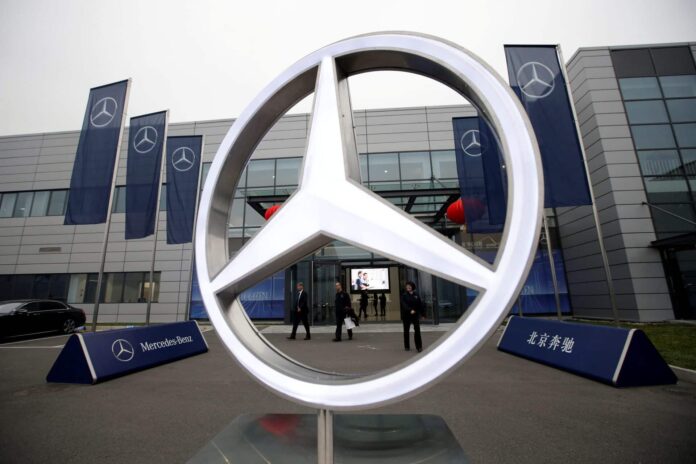On September 4th, the Mercedes-Benz Group announced their intention to invest more than 14 billion yuan (2 billion USD) with local partners to expand its product lineup in China. Starting from 2025, Mercedes-Benz will begin production of the China-exclusive all-electric long-wheelbase CLA model, long-wheelbase GLE SUV, and a new luxury electric MPV based on the VAN.EA platform.
This announcement comes with the backdrop of possible Volkswagen plant closure in Germany and recent EU tariffs on Chinese EVs. It also comes on the heels of two massive investments announced by fellow German automakers Volkswagen Group and BMW AG in April.
More on Mercedes’ investment

It has been reported that over 10 billion yuan (1.4 billion USD) will be allocated to passenger vehicle operations, while more than 4 billion yuan (550 million USD) will be invested in light commercial vehicles. These new domestically produced models will be manufactured by existing Mercedes joint ventures, Beijing Benz (joint venture with BAIC) and Fujian Benz.
Beijing Benz will begin producing new models on the MMA (Mercedes-Benz Modular Architecture) platform next year. The first local model produced will likely be the new all-electric long-wheelbase CLA. It features an efficient 800-volt platform with an energy conversion rate of 93% from battery to wheels. The model can achieve 400 km of range after 15 minutes of charge. Its energy efficiency reaches 12 kWh per 100 km.

Another key focus of this investment is the local research and production of the China-exclusive GLE SUV. Previously, the best-selling imported model in the Middle Kingdom, the new China-made GLE, will be the first model developed by the Mercedes’s Chinese R&D team. The new model will focus on rear-seat comfort and intelligent technologies tailored for the Chinese market.
The localized CLA and GLE will further enrich Mercedes’ lineup of locally produced models. Mercedes launched its first China-exclusive model, the long-wheelbase E-Class, in 2010. And its first locally produced SUV, the GLK-Class, in 2011. The company has gradually expanded its local production since 2019, with a total of 11 locally produced models, including six SUVs.

The commercial part of the investment will support Fujian Benz in producing a new luxury electric MPV based on the VAN.EA platform. All future medium and large light commercial vehicles will be built on the modular and scalable VAN.EA electric platform. Currently, the main light commercial vehicle models for Mercedes in China are the V-Class MPVs.
Fujian Benz was established in June 2007 as Mercedes’ light commercial vehicle production base building V-Class vehicles. The JV is one of the largest industrial companies in Fuzhou, the capital of Fujian. It counts Mercedes and BAIC as its two largest shareholders. In June of this year, Fujian Benz began laying the foundation for the production of VAN.EA platforms in Fuzhou.

Mercedes also disclosed information on its new MB.OS operating system, which will debut with the new local models. The system will feature a new virtual assistant as well as an “end-to-end” smart driving system. “End-to-end” smart driving is common terminology used by local manufacturers to describe their automated driving solutions that Mercedes has begun to adopt.
Mercedes Strategy
Ola Källenius, Chairman of Board of Management of the Mercedes of Mercedes-Benz Group, on his fourth China visit this year stated “The Chinese market is one of the key pillars of Mercedes-Benz Group’s global strategy and is a major driving force behind our transition to electrification and technological innovation. Mercedes-Benz remains committed to long-term investment in China, deeply engaging in and contributing to the upgrading of the Chinese automotive industry.” According to statistics from Mercedes, the company has invested over 100 billion yuan (14 billion USD) in China from 2014 to 2023, with 10 billion yuan (1.4 billion USD) going to R&D over the last five years.

Not only is Mercedes deepening its investments and local production in China. Other German auto giants are also increasing their investments in China. Volkswagen invested 2.7 billion USD to expand their Volkswagen Anhui operations. They are also in the midst of building two new EV models in collaboration with Xpeng. BMW, similarly, is investing an additional 20 billion yuan (2.8 billion USD) in its Shenyang production base. Its the total investment in the plant rose up to 105 billion yuan (14.7 billion USD).
Mercedes’ investment serves as a notable example of German automakers taking a different stance from the European Union on trade with China. In the new era of competition from domestic companies in electrification and smart driving tech, maintaining their edge in China has become an important challenge for the historic German auto industry. In a unified move, Germany automakers have chosen to localize and further embed their operations to compete with the rise of domestic players.
Sources: ITHome, Yicai, The Economic Observer


